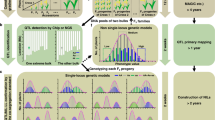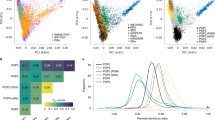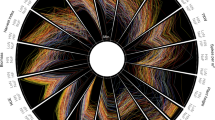Abstract
One of the main challenges of breeding programs is to identify superior genotypes from a large number of candidates. By gradually increasing the frequency of favorable alleles in the breeding population, recurrent selection improves the population mean for target traits, increasing the chance to identify promising genotypes. In rice, population improvement through recurrent selection has been used very little to date, except in Latin America. At Embrapa (Brazilian Agricultural Research Corporation), the upland rice breeding program is conducted in two phases: population improvement followed by product development. In this study, the CNA6 population, evaluated over five cycles (3 to 7) of selection, including 20 field trials, was used to assess the realized genetic gain. A high rate of genetic gain was observed for grain yield, at 215 kg.ha−1 per cycle or 67.8 kg.ha−1 per year (3.08%). The CNA6 population outperformed the controls only for the last cycle, with a yield difference of 1128 kg.ha−1. An analysis of the product development pipeline, based on 29 advanced yield trials with lines derived from cycles 3 to 6, showed that lines derived from the CNA6 population had high grain yield, but did not outperform the controls. These results demonstrate that the application of recurrent selection to a breeding population with sufficient genetic variability can result in significant genetic gains for quantitative traits, such as grain yield. The integration of this strategy into a two-phase breeding program also makes it possible to increase quantitative traits while selecting for other traits of interest.
This is a preview of subscription content, access via your institution
Access options
Subscribe to this journal
Receive 12 print issues and online access
$259.00 per year
only $21.58 per issue
Buy this article
- Purchase on Springer Link
- Instant access to full article PDF
Prices may be subject to local taxes which are calculated during checkout



Similar content being viewed by others
Data availability
The data used in this study are available at the following address: https://doi.org/10.5061/dryad.1g1jwsv28.
References
Ahmadi N, Bartholomé J, Tuong-Vi C, Grenier C (2020). Genomic selection in rice: empirical results and implications for breeding. CABI: Wallingford, pp 243–258
Atroch AL, Nunes GHD (2000) Genetic progress in lowland rice in the state of Amapa, Brazil. Pesqui Agropecu Bras 35(4):767–771
Baertschi C, Cao T-V, Bartholomé J, Ospina Y, Quintero C, Frouin J et al. (2021) Impact of early genomic prediction for recurrent selection in an upland rice synthetic population. G3 Genes|Genomes|Genetics 11(12):1–16
Baker RJ (2020). Selection indices in plant breeding. CRC Press
Barros MS, Morais Júnior OP, Melo PGS, Morais OP, Castro AP, Breseghello F (2018) Effectiveness of early-generation testing applied to upland rice breeding. Euphytica 214(4):61
Bartholomé J, Prakash PT, Cobb JN (2022). Genomic prediction: progress and perspectives for rice improvement. In: Ahmadi N and Bartholomé J (eds) Complex Trait Prediction: Methods and Protocols. Springer US: New York, NY, pp 569–617
Bernardo R (2003) On the effectiveness of early generation selection in self‐pollinated crops. Crop Sci 43(4):1558–1560
Bernardo R (2020) Breeding for quantitative traits in plants. 3. ed. Woodbury:Stemma Press
Breseghello F, de Mello RN, Pinheiro PV, Soares DM, Lopes Júnior S, Nakano, Rangel PH et al. (2021) Building the Embrapa rice breeding dataset for efficient data reuse. Crop Sci 61(5):3445–3457
Breseghello F, de Morais OP, Pinheiro PV, Silva ACS, da Maia de Castro E, Guimarães ÉP et al. (2011) Results of 25 years of upland rice breeding in Brazil. Crop Sci 51(3):914–923
Breseghello F, Morais O, Castro E, Prabhu A, Bassinello P, Pereira J et al. (2009) Recurrent selection resulted in rapid genetic gain for upland rice in Brazil. Int Rice Res News 34(4):1-4
Breseghello F, Rangel PHN, De Morais OP (1999) Yield gain through irrigated rice breeding in the Northeast Brazil. Pesqui Agropecu Bras 34(3):399–407
Ceccarelli S (2015) Efficiency of plant breeding. Crop Sci 55(1):87–97
Céron-Rojas JJ, Crossa J (2018). Linear selection indices in modern plant breeding. Springer Nature
Clarke GPY, Stefanova KT (2011) Optimal design for early-generation plant-breeding trials with unreplicated or partially replicated test lines. Aust NZ J Stat 53(4):461–480
Cobb JN, Juma RU, Biswas PS, Arbelaez JD, Rutkoski J, Atlin G et al. (2019) Enhancing the rate of genetic gain in public-sector plant breeding programs: lessons from the breeder’s equation. Theor Appl Genet 132(3):627–645
Colombari Filho JM, de Resende MDV, de Morais OP, de Castro AP, Guimaraes EP, Pereira JA et al. (2013) Upland rice breeding in Brazil: a simultaneous genotypic evaluation of stability, adaptability and grain yield. Euphytica 192(1):117–129
da Silva AC, Carneiro VQ, dos Santos IG, Rosado RDS, Cruz CD, Soares PC (2021) Genetic progress over twenty-three years of irrigated rice breeding in southeastern Brazil. Acta Sci Agron 43(1):1–12
de Souza MA, de Morais OP, Heran REC, Cargnin A, Pimentel AJB (2007) Genetic progress of upland rice between 1950 and 2001. Pesqui Agropecu Bras 42(3):371–376
Dudley JW (2007) From Means to QTL: The Illinois long-term selection experiment as a case study in quantitative genetics. Crop Sci 47(S3):S-20–S-31
Eberhart SA (1964). Least Squares method for comparing progress among recurrent selection methods1. Crop Sci 4(2): cropsci1964.0011183X000400020036x
Federer WT, Raghavarao D (1975) On augmented designs. Biometrics 31(1):29–35
Fischer RA, Edmeades GO (2010) Breeding and cereal yield progress. Crop Sci 50(S1):S-85–S-98
Fujimaki H (1979) Recurrent selection by using genetic male sterility for rice improvement. JARQ 13(3):153–156
Gaynor RC, Gorjanc G, Bentley AR, Ober ES, Howell P, Jackson R et al. (2017) A two-part strategy for using genomic selection to develop inbred lines. Crop Sci 57(5):2372–2386
Grenier C, Cao TV, Ospina Y, Quintero C, Chatel MH, Tohme J et al. (2015) Accuracy of genomic selection in a rice synthetic population developed for recurrent selection breeding. Plos One 10(8):1–25
Hallauer AR, Carena MJ, Miranda Filho JD (2010). Quantitative genetics in maize breeding, Vol 6. Springer Science & Business Media
Hallauer AR, Darrah LL (1985) Compendium of recurrent selection methods and their application. Crit Rev Plant Sci 3(1):1–33
Heinemann AB, Barrios-Perez C, Ramirez-Villegas J, Arango-Londoño D, Bonilla-Findji O, Medeiros JC et al. (2015) Variation and impact of drought-stress patterns across upland rice target population of environments in Brazil. J Exp Bot 66(12):3625–3638
Juma RU, Bartholomé J, Thathapalli Prakash P, Hussain W, Platten JD, Lopena V et al. (2021) Identification of an elite core panel as a key breeding resource to accelerate the rate of genetic improvement for irrigated rice. Rice 14(1):92
Kumar A, Raman A, Yadav S, Verulkar SB, Mandal NP, Singh ON et al. (2021) Genetic gain for rice yield in rainfed environments in India. Field Crops Res 260:107977
Laidig F, Piepho H-P, Drobek T, Meyer U (2014) Genetic and non-genetic long-term trends of 12 different crops in German official variety performance trials and on-farm yield trends. Theor Appl Genet 127(12):2599–2617
Legarra A, Christensen OF, Aguilar I, Misztal I (2014) Single Step, a general approach for genomic selection. Livest Sci 166:54–65
Mackay I, Horwell A, Garner J, White J, McKee J, Philpott H (2011) Reanalyses of the historical series of UK variety trials to quantify the contributions of genetic and environmental factors to trends and variability in yield over time. Theor Appl Genet 122(1):225–238
Martínez CP, Torres EA, Chatel M, Mosquera G, Duitama J, Ishitani M et al(2014) 5 rice breeding in Latin America Plant Breed Rev 38:187–278
Mead R (1997). Design of plant breeding trials. In: Kempton RA, Fox PN and Cerezo M (eds) Statistical Methods for Plant Variety Evaluation. Springer Netherlands: Dordrecht, pp 40–67.
Morais Júnior OP, Breseghello F, Duarte JB, Coelho ASG, Borba TCO, Aguiar JT et al. (2018a) Assessing prediction models for different traits in a rice population derived from a recurrent selection program. Crop Sci 58(6):2347–2359
Morais Júnior OP, Breseghello F, Duarte JB, Morais OP, Rangel PHN, Coelho ASG (2017) Effectiveness of recurrent selection in irrigated rice breeding. Crop Sci 57(6):3043–3058
Morais Júnior OP, Duarte JB, Breseghello F, Coelho ASG, Morais OP, Magalhães Júnior AM (2018b) Single-step reaction norm models for genomic prediction in multienvironment recurrent selection trials. Crop Sci 58(2):592–607
Morais Júnior OPD, Melo PGS, Morais OPD, Castro APD, Breseghello F, Utumi MM et al. (2015) Genetic progress after cycles of upland rice recurrent selection. Sci Agric 72:297–305
Morais OPD (2005). Genetic mean and variability in recurrent selection. In: Guimaraes EP (ed) Population improvement: A way of exploiting the rice genetic resources of Latin America. Food and Agriculture Organization of the United Nations (FAO): Rome
Moura AMD, Botelho FBS, Tomé LM, Rodrigues CS, Silva CSCD, Silva MPD (2021) Genetic progress in upland rice breeding program for grain yield and plant height. Ciência e Agrotecnologia 45(1):1–8
Muralidharan K, Prasad GSV, Roa CS (2002) Yield performance of rice genotypes in international multi-environment trials during 1976–97. Curr Sci 83(5):610–619
Peng S, Laza RC, Visperas RM, Sanico AL, Cassman KG, Khush GS (2000) Grain yield of rice cultivars and lines developed in the Philippines since 1966. Crop Sci 40(2):307–314
Piepho H-P, Laidig F, Drobek T, Meyer U (2014) Dissecting genetic and non-genetic sources of long-term yield trend in German official variety trials. Theor Appl Genet 127(5):1009–1018
Piepho HP, Möhring J, Melchinger AE, Büchse A (2008) BLUP for phenotypic selection in plant breeding and variety testing. Euphytica 161(1):209–228
Pinheiro LDS, Rangel PHN, Vianello RP, Brondani C (2012) Genetic variability of rice recurrent selection populations as affected by male sterility or manual recombination. Pesqui Agropecu Bras 47::808–814
Ramirez-Villegas J, Heinemann AB, Pereira de Castro A, Breseghello F, Navarro-Racines C, Li T et al. (2018) Breeding implications of drought stress under future climate for upland rice in Brazil. Glob Change Biol 24(5):2035–2050
Rangel PHN, de Morais OP, Zimmermann FJP (2002) Grain yield gains in three recurrent selection cycles in the CNA-IRAT 4 irrigated rice population. Crop Breeding Applied Biotechnology 2(3):369–374
Rutkoski JE (2019). A practical guide to genetic gain. In: Sparks DL (ed) Advances in Agronomy. Academic Press. Vol. 157, pp 217–249
Santos PG, Soares PC, Soares AA, Morais OPD, Cornélio VMDO (1999) Evaluation of the genetical progress obtained in 22 years on the improvement of irrigated rice in Minas Gerais, Brazil. Pesqui Agropec Bras 34::1889–1896
Singh R, Ikehashi H (1981) Monogenic male‐sterility in rice: induction, identification and inheritance 1. Crop Sci 21(2):286–289
Soares AA, Santos PG, De Morais OP, Soares PC, Reis MD, De Souza MA (1999) Genetic progress obtained by upland rice breeding in twenty one years of research in the state of Minas Gerais, Brazil. Pesqui Agropecu Bras 34(3):415–424
Spindel J, Begum H, Akdemir D, Virk P, Collard B, Redoña E et al. (2015) Genomic selection and association mapping in rice (oryza sativa): effect of trait genetic architecture, training population composition, marker number and statistical model on accuracy of rice genomic selection in elite, tropical rice breeding lines. PLoS Genet 11(2):e1004982
Taillebois J, Guimaraes E. (1989) International Symposium on Hybrid Rice, Changsha, Hunan (China), 6–10 Oct 1986. IRRI
UNITED NATIONS (2017) Department of Economic and Social Affairs. World population projected to reach 9.8 billion in 2050, and 11.2 billion in 2100
van Ginkel M, Ortiz R (2018) Cross the best with the best, and select the best: HELP in breeding selfing crops. Crop Sci 58(1):17–30
Walsh B, Lynch M (2009). Evolution and selection of quantitative traits. Foundations Sunderland, MA: Sinauer
Wang W, Mauleon R, Hu Z, Chebotarov D, Tai S, Wu Z et al. (2018) Genomic variation in 3010 diverse accessions of Asian cultivated rice. Nature 557(7703):43–49
Zystro J, Colley M, Dawson J (2018). Alternative experimental designs for plant breeding Plant Breed Rev, 87–117
Acknowledgements
The authors acknowledge the work of all collaborators from partner institutions who contributed to the conduction of the field trials and collected the data used in our study. We also want to thank CIRAD for the historical and fruitful partnership and Embrapa for granting a scholarship to the first author. Most of the data from CNA6 population was generated under the coordination of Dr. Orlando Peixoto de Morais, a brilliant scientist and human being who dedicated his life to rice improvement, guaranteeing enormous benefits to Brazilian society.
Author information
Authors and Affiliations
Contributions
The experiments were performed by AC, FB, IVF, MMU and JAP. TVC, AC and JB performed the analysis. AC and JB wrote the first draft of the manuscript, which was further edited by all the co-authors. AC and JB designed and coordinated the study. All the authors have read and approved the final manuscript.
Corresponding author
Ethics declarations
Competing interests
The authors declare no competing interests.
Additional information
Publisher’s note Springer Nature remains neutral with regard to jurisdictional claims in published maps and institutional affiliations.
Associate editor Alison Bentley.
Supplementary information
Rights and permissions
Springer Nature or its licensor (e.g. a society or other partner) holds exclusive rights to this article under a publishing agreement with the author(s) or other rightsholder(s); author self-archiving of the accepted manuscript version of this article is solely governed by the terms of such publishing agreement and applicable law.
About this article
Cite this article
Pereira de Castro, A., Breseghello, F., Furtini, I.V. et al. Population improvement via recurrent selection drives genetic gain in upland rice breeding. Heredity 131, 201–210 (2023). https://doi.org/10.1038/s41437-023-00636-3
Received:
Revised:
Accepted:
Published:
Issue Date:
DOI: https://doi.org/10.1038/s41437-023-00636-3
This article is cited by
-
Genetic gains in IRRI’s rice salinity breeding and elite panel development as a future breeding resource
Theoretical and Applied Genetics (2024)
-
Realized Genetic Gain in Rice: Achievements from Breeding Programs
Rice (2023)



